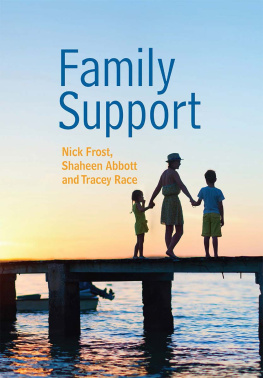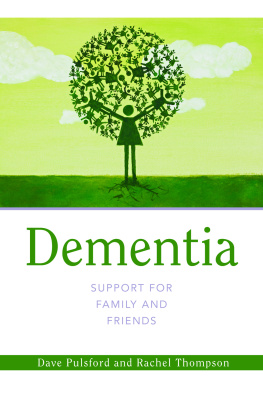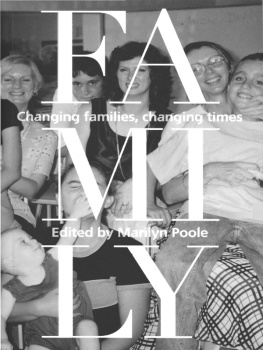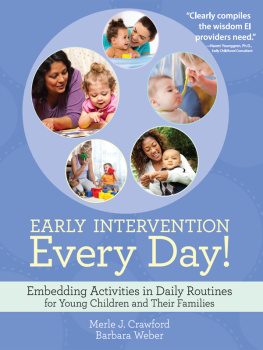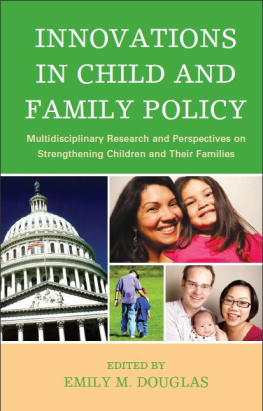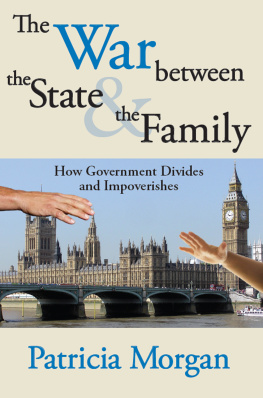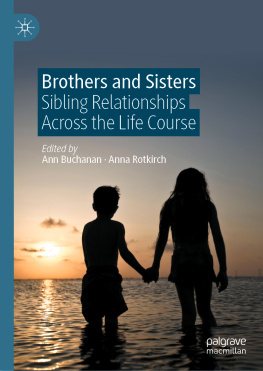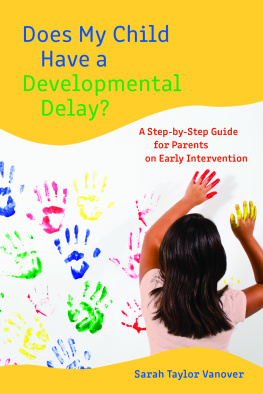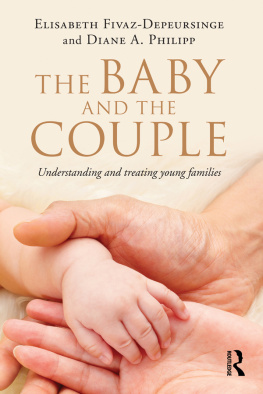Contents
Guide
Print Page Numbers

Social Work in Theory and Practice series
Nick Frost, Shaheen Abbott & Tracey Race, Family Support
Kate Karban, Social Work and Mental Health
Ann McDonald, Social Work with Older People
Roger Smith, Social Work with Young People
Skills for Contemporary Social Work series
Tony Evans & Mark Hardy, Evidence and Knowledge for Practice
Andrew Hill, Working in Statutory Contexts
Hazel Kemshall, Bernadette Wilkinson & Kerry Baker, Working with Risk
Also from Polity:
Anne Llewellyn, Lorraine Agu & David Mercer, Sociology for Social Workers, 2nd edition
Family Support
Prevention, Early Intervention and Early Help
Nick Frost, Shaheen Abbott and
Tracey Race
polity
Copyright Nick Frost, Shaheen Abbott and Tracey Race 2015
The right of Nick Frost, Shaheen Abbott and Tracey Race to be identified as Author of this Work has been asserted in accordance with the UK Copyright, Designs and Patents Act 1988.
First published in 2015 by Polity Press
Polity Press
65 Bridge Street
Cambridge CB2 1UR, UK
Polity Press
350 Main Street
Malden, MA 02148, USA
All rights reserved. Except for the quotation of short passages for the purpose of criticism and review, no part of this publication may be reproduced, stored in a retrieval system, or transmitted, in any form or by any means, electronic, mechanical, photocopying, recording or otherwise, without the prior permission of the publisher.
ISBN-13: 978-1-5095-0247-9
A catalogue record for this book is available from the British Library.
Library of Congress Cataloging-in-Publication Data
Frost, Nick, 1953
Family support : prevention, early intervention and early help / Nick Frost, Shaheen Abbott, Tracey Race.
pages cm
Includes bibliographical references and index.
ISBN 978-0-7456-7259-5 (hardback : alk. paper) -- ISBN 978-0-7456-7260-1 (pbk. : alk. paper) 1. Family services. 2. Family social work. 3. Families. I. Abbott, Shaheen. II. Race, Tracey. III. Title.
HV697.F76 2015
362.8253--dc23
2015004490
The publisher has used its best endeavours to ensure that the URLs for external websites referred to in this book are correct and active at the time of going to press. However, the publisher has no responsibility for the websites and can make no guarantee that a site will remain live or that the content is or will remain appropriate.
Every effort has been made to trace all copyright holders, but if any have been inadvertently overlooked the publisher will be pleased to include any necessary credits in any subsequent reprint or edition.
For further information on Polity, visit our website:
politybooks.com
Acknowledgements
NF: Thanks to Andy Lloyd, Fiona Abram, Hannah Burgess, Sue Elmer and Richard Skues for help with various aspects of this book. Thanks to Dawn for all your support.
SA: Thank you to my copiously patient husband, Bryn. Thank you to the families, to those who work with them and continue to believe in fighting for them. Thank you to my team in Leeds, who demonstrate this daily, with unrelenting strength and respect.
TR: Appreciation for the support of my family and also to the social work team at Leeds Beckett University.
Introduction
The idea of prevention has been an essential element of child welfare practice since its Victorian origins (Stedman Jones 1976): what has changed over the years has been the way the aim of preventing the emergence of social and family problems has been conceptualized in policy and then put into practice. These changes are reflected in family support projects aimed at preventing family breakdown and related social problems; such projects include the Victorian National Society for the Prevention of Cruelty to Children (NSPCC), the post-Second World War Family Service Units, the New Labour Sure Start initiative and the contemporary Troubled Families programme. Such initiatives reflect changing ideologies about, and approaches to, family support. These ideologies are also reflected in shifting terminology from prevention through to contemporary debates about family support, early intervention and early help. These important conceptual issues will be discussed and dissected in the opening chapters of this book and will inform the rest of our policy and practice analysis.
Surprisingly little has been written about family support, especially in the form of texts suitable for students and/or books which focus on how to actually plan, organize and deliver family support. One aim of this book is to address this gap by producing a readable, accessible and practical text aimed at outlining and explaining current theory, policy, research and practice relating to family support. We aim to make a contribution to the rehabilitation of family support as a concept and as a practice: we want to argue strongly in favour of the crucial role of family support which in recent years has been displaced by the predominant safeguarding and child protection agenda (see Featherstone, White and Morris 2014).
This book is made up of chapters which can be read independently, but which as a whole are intended to provide a comprehensive overview of family support theory, policy, practice and research. One aim of the book is to help future and current child welfare professionals extend their use of theory and research to inform their practice within a changing and complex multi-agency context.
The book is designed for all those professionals involved in child welfare and safeguarding education and training at undergraduate and postgraduate levels, as well as at more experienced practitioners progressing towards post-qualifying awards or those in practice who want to inform their family support practice. In recent years, there has been a growth in degree-level programmes with titles such as Child and Family Studies, or indeed Family Support Studies, for which this may be a core book. We also hope that the book will be of interest to academics, researchers and policy makers alike.
Whilst this book is part of a series aimed primarily at social workers we contend that family support is essentially multi-disciplinary or indeed trans-disciplinary. Social workers do have a key role: we hope they can apply some of the approaches discussed here in all their work, including safeguarding and looked-after children work (Frost and Parton 2009). The role of family support has however been displaced from social work to a myriad of other settings and professions and para-professionals, so we hope the book is of interest, for example, to youth workers, play workers, community health staff, children centre staff and many others.
The book stresses the existence of a continuum in relation to family support practice from universal family support through to the targeted safeguarding of vulnerable children and young people. This continuum reflects that, while all families require some sort of support in raising their children, some identified families will be recognized as families with children in need or as troubled families, while a smaller number will receive family support as part of a child protection plan. The book draws on restorative practices those that are high on support but are also authoritative in providing clear limits and boundaries (see http://www.irrp.edu/).
The eight features of family support outlined below have underpinned our analysis in this book.

